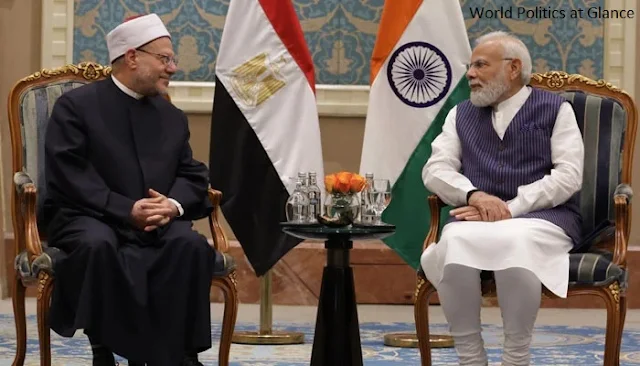Indian Prime
Minister Narendra Modi's two-day visit to Egypt is being hailed as a potential
"game changer" for bilateral relations.
Analysts are expecting
that the visit will pave the way for increased Indian investment in Egypt and
potentially provide Egypt with a path to joining the BRICS economic bloc.
The details of
the visit is discussed further.
Strengthening Strategic Relations and Exploring New Areas of Engagement:
Modi's visit
marks his first as prime minister and the first by an Indian prime minister
since 1997.
It follows
Egyptian President Abdel Fattah el-Sisi's visit to India in January, where he
was the chief guest at India's Republic Day celebrations.
The visit is
seen as a continuation of the elevated strategic relationship established
during el-Sisi's visit.
It comes with the
expectations of further expansion in trade and economic engagement.
Reciprocal Visit Reflects Continuity and Momentum:
The quick
reciprocal visit, coming just six months after el-Sisi's visit to India,
demonstrates the commitment to maintaining the momentum in the bilateral
relationship.
Indian foreign
ministry spokesperson Arindam Bagchi expressed confidence that the visit would
not only strengthen the ties but also explore new areas of trade and economic
cooperation.
Diversifying Partnerships and Global Influence:
On the one
hand, Egypt seeks to diversify its partnerships beyond the Western bloc, while
on the other India aims to consolidate its position as a voice of the Global
South, especially as it prepares to host the G20 meeting in September.
Both countries
have historically enjoyed friendly relations and were founding members of the
Non-Aligned Movement.
Strategic Access to the Middle East and North Africa:
Egypt's
repeated visits to India and its desire to increase Indian investment indicate
its interest in deeper ties with India.
Egypt's
geostrategic significance as the gateway to major markets in Europe and Africa,
as well as its crucial location along the Suez Canal, presents opportunities
for India to expand its presence in the Middle East and North Africa region.
Balancing China and Expanding Regional Influence:
Analysts
suggest that Modi aims to balance China's influence within BRICS and prevent
Pakistan, a close ally of China, from joining the bloc.
By supporting
Egypt's desire to join BRICS, India can project itself as a significant player
in the Arab world and Africa.
It also allows
India to counterbalance China's growing presence in Egypt and increase its
regional influence.
India has also
been concerned about China’s growing influence in Egypt.
China’s
bilateral trade with Egypt is currently at $15bn, double that of India’s
$7.26bn in 2021-22. The latest bilateral trade reached $5.18bn from April 22 to
January 23.
Economic Challenges and Mutual Benefits:
Egypt's economy
has faced challenges due to the pandemic and the Russia-Ukraine war's impact on
its food supply and foreign exchange reserves.
In 2022,
despite putting restrictions on wheat exports, India stepped in to assist
crisis-ridden Egypt and allowed shipments of 61,500 metric tonnes to the country.
Egypt looks to
India for investment to meet its foreign debt obligations and maintain food
security.
For India, closer
ties with Egypt can provide access to major markets and counter China's trade
dominance in the region.
Access to Europe, Africa, and Israel:
India's broader
foreign policy outreach aims to enhance its stature in the Global South.
By aligning
with Egypt, India gains deeper access to the Arab world, Africa, and the
opportunity to strengthen ties with Israel.
Egypt's
declining influence in regional affairs presents India with an opportunity to
fill the gap and expand its presence on the international stage.
Fazzur Rahman
Siddiqui, senior research fellow at the Indian Council of World Affairs (ICWA),
New Delhi, was quoted by Al Jazeera as saying;
“Egypt has lost its voice in regional affairs
like in Palestine, Ethiopia, and many African countries over the years. The
kind of say it used to have; they have lost their shine. And Egypt is now
looking beyond the continent, and India happens to be potential for its growing
stature.”
Solidifying Relations and Exploring New Horizons:
The Egyptian
ambassador to India, Wael Mohamed Awad Hamed expressed optimism about the
visits, describing them as "game-changers" that reinforce each
other's position on the international front.
He highlighted
the potential for Egypt to serve as a springboard for India's connections to
Europe, the Middle East, and Africa.
The
establishment of direct air connections and the possibility of an Indian
industrial zone in Egypt further solidify the bilateral relationship and open
new horizons for cooperation.
(Courtesy;
Al-Jazeera)

Post a Comment
0Comments